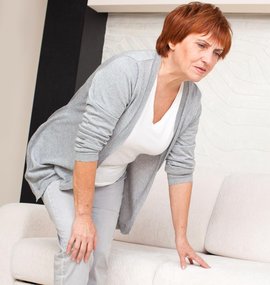Managing Arthritis
Arthritis is an inflammatory condition that can affect the joints, cartilage, muscles, and bones in your body. The pain and discomfort that arthritis causes can also lead to a reduced range of motion as well as the loss of normal mobility. The most common form of arthritis is osteoarthritis, which refers to the breakdown of cartilage that provides protection and cushioning for the joints. Osteoarthritis sufferers typically experience mild to moderate pain during the early stages of this condition as well as stiffness, especially during periods of rest. The stiffness often improves during activity, but as the condition progresses, simple tasks such as walking, climbing stairs, and even sleeping comfortably becomes increasingly difficult.
 An individual may also be diagnosed with rheumatoid arthritis (RA), which is a systemic condition characterized by inflammation of joint tissue. People suffering with this form of arthritis generally experience pain and swelling in the affected joints and in some cases, severe joint damage. Diagnosing rheumatoid arthritis during the early stage is one of the best ways to avoid intense, chronic pain and joint damage.
An individual may also be diagnosed with rheumatoid arthritis (RA), which is a systemic condition characterized by inflammation of joint tissue. People suffering with this form of arthritis generally experience pain and swelling in the affected joints and in some cases, severe joint damage. Diagnosing rheumatoid arthritis during the early stage is one of the best ways to avoid intense, chronic pain and joint damage.
Although there is no known cure for rheumatoid arthritis, there are a number of beneficial medications and strategies that provide pain relief and help individuals maintain or regain mobility and maximize their daily functioning.
Due to the more complex nature of rheumatoid arthritis, the focus of this article will be primarily on osteoarthritis. For a more detailed look at RA, please see our patient guide.
Coping with advanced osteoarthritis commonly entails using devices that help protect the joints such as walking aids, braces or bands, using hot/cold packs, and engaging in low-intensity exercise, and taking pain-relieving medication as needed. Receiving treatment, including physiotherapy, early on is also key to reversing or preventing the progression of osteoarthritis. Clinical research indicates that certain types of resistance and endurance exercise can improve symptoms for people suffering from most forms of arthritis in the early stages of the condition. People who have arthritis may think that they should not exercise or try to avoid doing so because they fear that their pain will worsen, however, when this type of exercise is guided by a physiotherapist, it can be quite beneficial.
Research suggests that regular exercise, weight control, and finding ways to avoid joint injuries reduces the incidence of arthritis and the flare up of symptoms. Performing exercises that are guided by a physiotherapist can help ensure that you are getting the exercise you need to strengthen the muscles that support your joints and reduce pain, while avoiding additional injuries. More specifically, your physiotherapist will make sure that you are only engaging in physical activity your body can cope with as you gradually begin to regain the ability to carry out daily tasks with ease.
If you’re noticing pain in your joints that is gradually beginning to intensify, you may benefit from physiotherapy. A physiotherapist will assess your muscles, joints, and nervous system, look at how you move, and explore your work and leisure activities to determine the possible causes of your pain and discomfort. Individual treatment will often entail hands-on work to the body structures that have been affected as well as education and rehabilitative exercise to keep you pain and injury free.
For more information on osteoarthritis and other forms of arthritis, see our patient guide.
References
- Erdem E. Prevalence of chronic conditions among medicare part a beneficiaries in 2008 and 2010: are medicare beneficiaries getting sicker? Prev Chronic Dis. 2014; 11:E10.
- Superio-Cabuslay E, Ward MM, Lorig KR. Patient education interventions in osteoarthritis and rheumatoid arthritis: A meta-analytic comparison with nonsteroidal anti-inflammatory drug treatment. Arthritis & Rheumatism. 1996;9(4):292-301.
- Nessen T, Opava CH, Martin C, Demmelmaier I. From clinical expert to guide: Experiences from coaching people with rheumatoid arthritis to increased physical activity. Phys Ther. 2014; in press.
- Messier SP, Mihaiko SL, Legault C, et al. Effects of intensive diet and exercise on knee joint loads, inflammation, and clinical outcomes among overweight and obese adults with knee osteoarthritis: The IDEA randomized clinical trial. JAMA. 2013; 310(12): 1263-1273.
- Iversen MD, Chhabriya RK, Shadick N. Phys Ther. Predictors of the use of physical therapy services among patients with rheumatoid arthritis. Phys Ther. 2011; 91(1): 65-76.
